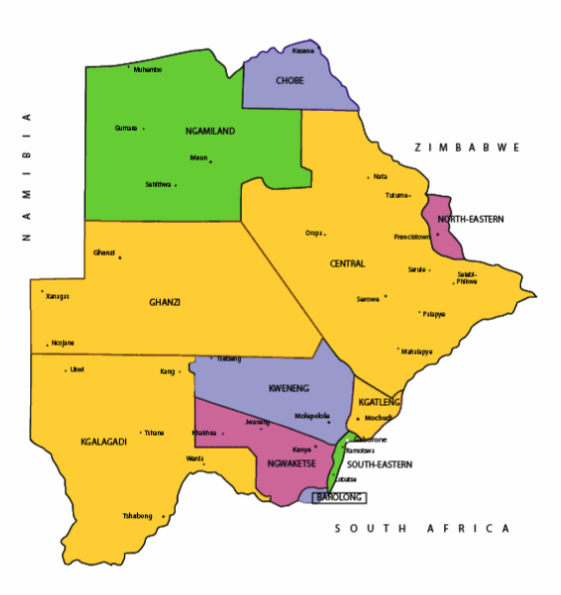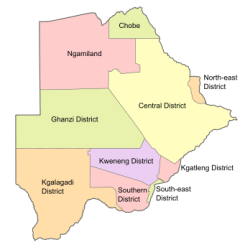Places and their polling stations in Ghanzi South, Botswana
482 Metsimantsho-Ncojane
2230 Metsimantsho Primary School
2231 Ranyane Kgotla
2232 Farm 234-Mj (Maisantlole)
2233 Ncojane Primary School
2234 Metsimantle Kgotla
2235 Marakanelo JSS
483 Kule-Makunda
2236 Kule Primary School
2237 Morama Borehole
2238 Tshukudu Borehole
2239 Makunda Primary School
2240 Farm 8 (Kasume)
2241 Tjievarongo Borehole
484 Charleshill
2242 Boipelo Primary School
2243 Rethuseng JSS
2244 Xanagas Primary School
2245 Dryhoek Borehole
485 Karakubis-New Xanagas
2246 Karakubis Primary School
2247 Legonono Borehole
2248 New Xanagas Primary School
486 Kalkfontein
2249 Tshimologo JSS
2250 Kalkfontein Primary School
487 Chobokwane
2251 Chobokwane Primary School
2252 Gwana Borehole
488 Hanahai
2253 East Hanahai Primary School
2254 West Hanahai Primary School
489 Kacgae-Bere
2255 Kacgae Primary School
2256 Bere Primary School
490 New Xade
2257 Kjoe Primary School
2258 Madirelo Complex
Reference: iec.gov.bw/index.php/electoral-districts/polling-stations.html
Botswana
Botswana is a country in Africa. It is topographically flat, with approximately 70 percent of its territory being the Kalahari Desert.
It is bordered by South Africa to the south and southeast, Namibia to the west and north, and Zimbabwe to the northeast.
Capital: Gaborone
Currency: Botswanan Pula
Official language: English
Population: 2.588 million (2021) World Bank
Dialing code: +267
Gross Domestic Product: 17.61 billion USD (2021) World Bank
Botswana’s ten districts are:
- Southern District
- South-East District
- Kweneng District
- Kgatleng District
- Central District
- North-East District
- Ngamiland District
- Kgalagadi District
- Chobe District
- Ghanzi District
Botswana’s councils created from urban or town councils are: Gaborone City, Francistown, Lobatse Town, Selebi-Phikwe Town, Jwaneng Town, Orapa Town and Sowa Township.






The name Botswana refers to ‘Land of the Tswana’. The landlocked, Southern Africa country is officially known as the Republic of Botswana.














Botswana is connected to Zambia through the Kazungula Bridge making it the world’s shortest border between two countries.
A country of slightly over 2 million people (2021), Botswana is one of the most sparsely populated countries in the world. It is essentially the nation state of the Tswana ethnic group, who make up 79% of the population.

About 11.6 per cent of the population lives in the capital and largest city, Gaborone.
Formerly one of the world’s poorest countries—with a GDP per capita of about US$70 per year in the late 1960s—it has since transformed itself into an upper-middle-income country, with one of the world’s fastest-growing economies.


The Tswana ethnic group were descended mainly from Bantu-speaking tribes who migrated southward of Africa to modern Botswana, living in tribal enclaves as farmers and herders.




In 1885, the British colonised the area and declared a protectorate under the name of Bechuanaland.
As colonisation stopped, Bechuanaland became an independent republic under its current name on 30 September 1966.


Since then, it has been a representative republic, with a consistent record of uninterrupted democratic elections and the lowest perceived corruption ranking in Africa since at least 1998.

The economy is dominated by mining and tourism. Botswana has a GDP (purchasing power parity) per capita of about $18,113 as of 2021, one of the highest in subsaharan Africa.


Botswana is the world’s biggest diamond producing country.
Its relatively high gross national income per capita gives the country a high standard of living and the third-highest Human Development Index of continental Sub-Saharan Africa (after Gabon and South Africa).
The country has been adversely affected by the HIV/AIDS epidemic. In 2002, Botswana began offering anti-retroviral drugs (ARVs) to help combat the epidemic.
Botswana is a member of the Southern African Customs Union, the Southern African Development Community, the Commonwealth of Nations, and the United Nations.

